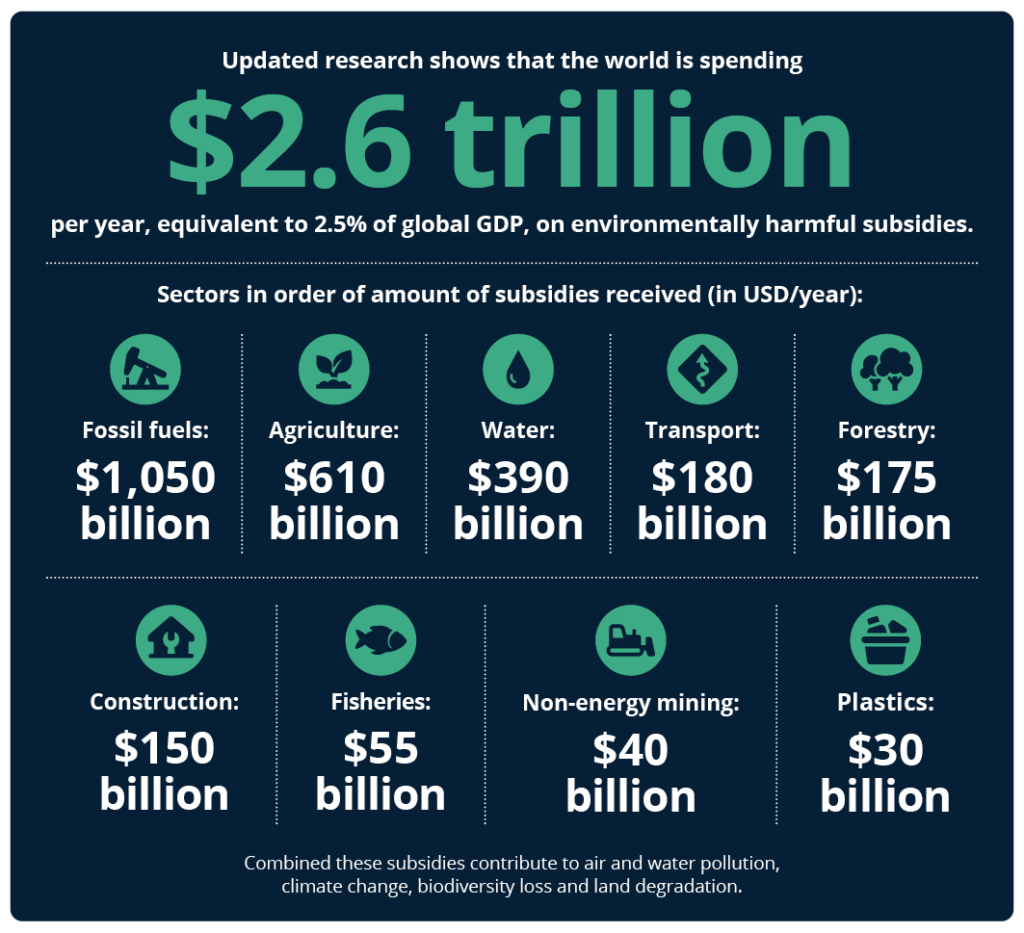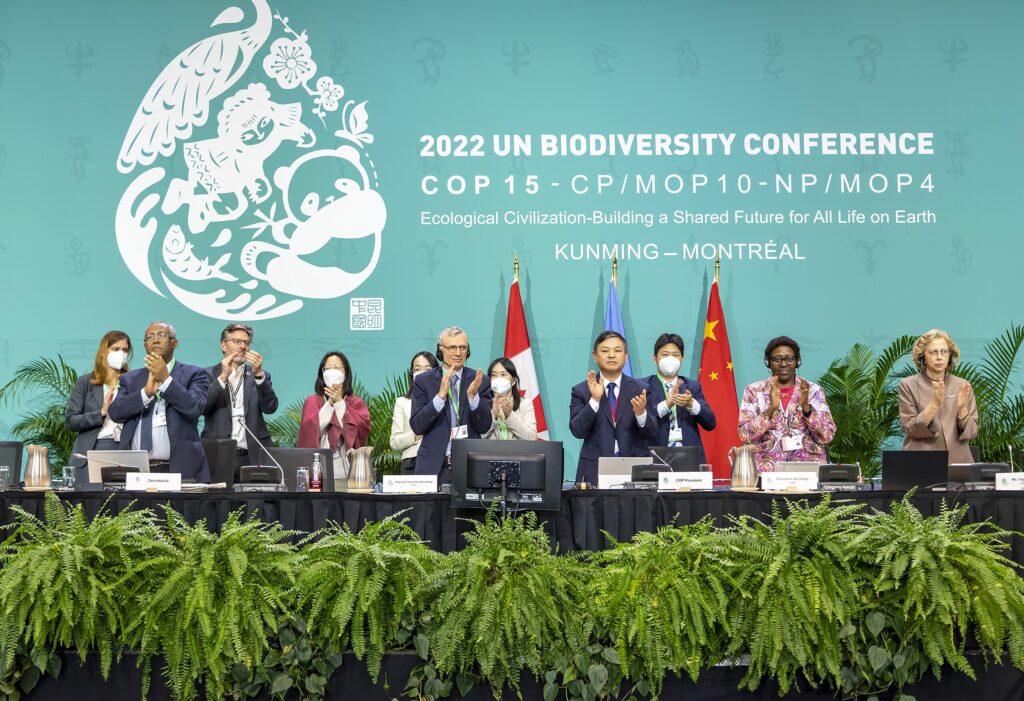Government Subsidies to Planet-Harming Sectors Surpass $2.6T, Going Against Global Climate Goals
5 Mins Read
Since 2022, environmentally harmful subsidies from governments have risen by roughly $800B, now accounting for 2.5% of the world’s GDP each year.
Despite pledging to repurpose at least $500B of planet-harming subsidies a year by 2030, governments around the world have poured $800B more into fossil fuels, deforestation and water pollution, new research has found.
Since 2022, when the Kunming-Montreal Global Biodiversity Framework was signed, countries’ contributions to climate-destroying sectors have crossed $2.6T, or 2.5% of the global GDP, per year.
Governments have been granting subsidies, tax breaks, below-market leases and other funds to activities that go against the promises they made at the biodiversity COP15 in Montreal two years ago, the report by the organisation Earth Track revealed.
“Despite 196 governments agreeing to reform harmful subsidies in 2022, progress has been too slow. We’re spending more than ever on subsidies that are unintentionally destroying the planet on which all our livelihoods and economies depend,” said Eva Zabey, CEO of Business for Nature, a global coalition of conversation agencies.
Fossil fuel use drives rise in climate-harming subsidies

Doug Koplow and Ronald Steenblik are leading experts on government subsidies relating to the environment, and their latest work is an update on their review from 2022, which incorporated multiple sectors affecting resource extraction and land use change.
The authors argue that most international analyses of subsidies are too focused on a single sector, but it’s in fact the combined effect that drives nature and biodiversity loss. In the new report, they have included estimates from non-energy mining and plastics production.
This – combined with improved data, inflation, and rising fossil fuel subsidies – primarily led to the $800B hike. When adjusted for inflation, this increase amounts to $570B.
The fossil fuel sector saw the largest spike, with subsidies up by an average of $340B a year owing to the war in Ukraine and consequent energy price surges. Government subsidies towards carbon capture and sequestration, as well as energy stockpiling, took the sector’s annual total to $1.05T.
The report notes that fossil fuel subsidies represented over 10 times the total revenues from carbon pricing schemes. Meanwhile, additional large-scale funding of international fossil fuel projects via public lenders provided nearly $50B a year during 2020-22 – lending has been “heavily skewed” towards oil and gas over clean energy.
At $600B, agriculture received the second-largest share of annual subsidies. Total subsidies are actually much higher, but much of this funding went to support food security, so isn’t considered planet-harming. Still, the farming sector saw a $25B hike in public subsidies, mostly for monoculture and biofuels.
The fishing industry was the recipient of $55B in subsidies, geared towards large fisheries that promote overfishing and are linked to illegal, unregulated, and unreported catch. Subsidies towards water totalled $390B, going towards direct freshwater withdrawal for agriculture (71% of the share) and industry (16%). Only 6% of these subsidies benefit the lowest income quintile.
Other harmful industries that have benefitted from state support include transportation ($180B in subsidies), forestry ($175M), construction ($150B), non-energy mining ($40B), and plastics ($30B).
Governments must deliver on subsidy reform promise at COP16

At COP15, governments pledged to redirect subsidies worth half a trillion towards policies that benefit people and the planet, as part of the Kunming-Montreal Global Biodiversity Framework.
In the text of Target 18, governments vowed to “identify by 2025, and eliminate, phase out or reform incentives, including subsidies, harmful for biodiversity, in a proportionate, just, fair, effective and equitable way, while substantially and progressively reducing them by at least $500B by 2030”. They said they would start with the “most harmful incentives, and scale up positive incentives for the conservation and sustainable use of biodiversity”.
The numbers from this Earth Track’s report show that these promises aren’t on track. And that’s before you realise that the figures were likely an underestimate due to the lack of high-quality data.
That said, some governments have begun to assess the impact of these subsidies. The Netherlands has published a report on food and nature subsidies and their impact on biodiversity, Brazil’s federal audit court is examining whether the country is prepared to repurpose subsidies, and the EU has produced a draft methodology for subsidy reform.
To help governments advance their efforts, Business for Nature has published a list of ways to implement Target 18. It’s asking countries to conduct national assessments to identify the scale and types of subsidy mechanisms, co-develop and publish a robust reform roadmap, and redirect planet-harming subsidies while ensuring a just transition and bolstering social purposes.
Countries should also enhance accountability and governance of such policies, and advance international cooperation on the issue. Governments will meet at COP16 in Colombia next month, and they’re being urged to keep the promises they made in the last biodiversity summit.
“With COP16 fast approaching, it’s time for governments to ditch these harmful subsidies and redirect them to accelerate the transition to a nature-positive economy for all,” said Zabey. “Businesses have an important role to play, starting by assessing their dependencies and actively supporting governments in their reform efforts.”
Meanwhile, food awareness organisation ProVeg International is calling on world leaders to recognise the potential of food system change, which it says should be the leading strategy to stop Amazonian deforestation.
“We really hope to get this message across at the biodiversity summit in Colombia in a way that inspires countries to take concrete action and introduce policies that will save our precious wildlife,” said Laura Weidgenant, the non-profit’s senior UN policy manager.



